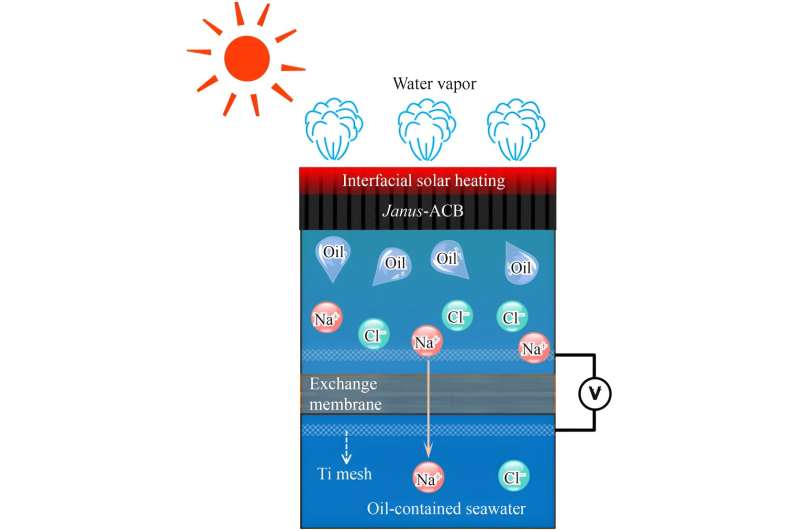This article has been reviewed according to Science X's editorial process and policies. Editors have highlighted the following attributes while ensuring the content's credibility:
fact-checked
proofread
An eco-friendly solar-driven protocol solves water-oil separation

The discharge of nuclear wastewater from Japan has drawn concern and condemnation from countries around the world. As a result, the issue of marine pollution is once again in the spotlight. Among the traditional marine environmental problems, oil pollution is one of the most serious types.
Typically, oil pollution comes from a variety of sources, including oil spills from ships, offshore drilling operations, and leaks from oil pipelines. Oil spills, in particular, can be devastating to local marine life and marine ecosystems. Oil forms a thick sludge in the water that smothers fish, gets caught in the feathers of seabirds, and blocks light from photosynthetic aquatic plants.
Coral reefs, on the other hand, would lose their vitality in a heavily oil-contaminated environment. This would also have a negative impact on local tourism and fisheries, resulting in a direct and huge economic loss.
One way to address this serious problem is to develop an effective oil separation technique to remove oil from wastewater. In the past, researchers have proposed several separation protocols. However, traditional protocols usually have low separation efficiency and high energy consumption, and often cause secondary pollution. Therefore, they are not economical to use for large-scale marine oil pollution control. The development of an environmentally friendly, cost-effective, and highly efficient alternative approach is of great urgency.
Researchers in China have now proposed a brand new concept for separating oil-water mixtures using solar thermal energy. By directly utilizing solar energy, this new protocol can separate two-phase mixtures with minimal environmental impact. In addition, it basically works on any oil-contaminated seawater surface with sunlight, so geographical limitation is no longer an issue.
Other cool features include the ability to simultaneously generate electricity, high oil removal efficiency (>99%), and long-term stability. With these excellent results, the research team has shown us an environmentally friendly and cost-effective method for extracting resources from oil-contaminated seawater.
Their secret weapon comes from a smartly designed wood absorber. The choice of wood is one of the factors that makes this approach so cost and environmentally friendly. The wood absorber is carbonized and shows excellent light adsorption capability. To construct the final device, the team has furthermore applied the Janus structure, which has been widely used in oil/water separation.
Taking advantage of the Janus structure, their device shows long-term stability with no apparent performance degradation after many test cycles. In standard tests, their Janus wood absorber shows an excellent oil removal rate, even for oily wastewater with a very high concentration.
Looking ahead, the team's future studies will include more case studies and take into account more factors that would affect the process of actual oil-water separation. For example, weather conditions and photothermal conversion performance. "There is still a long way to go," said the research team.
The research is published in the journal Frontiers of Environmental Science & Engineering.
More information: Yue Yang et al, Solar evaporation for simultaneous oil-water separation and electricity generation with Janus wood-based absorbers, Frontiers of Environmental Science & Engineering (2023). DOI: 10.1007/s11783-024-1775-8

















